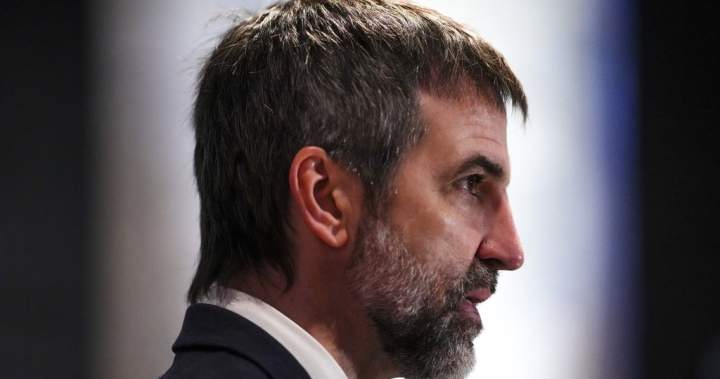Former environment minister and current Canadian Identity and Culture Minister Steven Guilbeault said Thursday he is resigning from cabinet, just hours after Prime Minister Mark Carney signed an energy and pipeline deal with Alberta.
Guilbeault will stay on as the Liberal MP for his Montreal-area riding.
In a statement, Guilbeault outlined the “historic” environmental progress made by the Liberal government over the past 10 years that he helped bring forward, including the emissions reduction plan and national adaptation strategy.
However, he said that since Carney’s election win this spring, “several elements of the climate action plan I worked on as Minister of the Environment have been, or are about to be, dismantled,” and suggested the Alberta deal was the final straw.
“Changes in our relationship with the United States have led to profound disruptions affecting the global order, diplomatic relations, and the economy,” he wrote. “I understand and share the prime minister’s efforts to ensure our country remains united and that all regions feel they have a voice.
“Despite this difficult economic context, I remain one of those for whom environmental issues must remain front and centre. That is why I strongly oppose the memorandum of understanding between the federal government and the government of Alberta.”
Guilbeault had been rumoured to be unhappy with Carney’s decision to agree to a memorandum of understanding (MoU) that outlines conditions under which a potential new oil pipeline could be built to the northwest coast of British Columbia.

Get breaking National news
For news impacting Canada and around the world, sign up for breaking news alerts delivered directly to you when they happen.
The MoU unveiled Thursday also exempts Alberta from Canada’s Clean Electricity Regulations — which Guilbeault called “a serious mistake” — and sets the stage for developing the Pathways Alliance carbon capture and storage project.
A senior government source told Global News on Wednesday that Guilbeault and Carney spoke about the pipeline MoU in what was described as an “honest and candid” conversation.
However, the source had said Guilbeault would not be resigning from cabinet.
In a statement, Carney thanked Guilbeault for his leadership on environmental issues and for “his counsel and contributions to our new government, which shares his fundamental commitment to climate ambition and climate competitiveness for Canada.”
“While we may have differing views at times on how exactly we make essential progress, I am glad Steven will continue to offer his important perspectives as a Member of Parliament in our Liberal caucus,” Carney said.
One of the leading environmentalists in the Liberal caucus, Guilbeault is a major political figure for the Liberals in his home province of Quebec and was a staunch defender of the consumer carbon tax brought in under Justin Trudeau.
Despite Carney’s dumping the consumer carbon tax as his first act as prime minister, Guilbeault, a former Greenpeace activist, agreed to run again and endorsed Carney in the Liberal leadership race.
“When I entered politics, it was because I had a deep conviction that I could make a difference in fighting climate change and protecting our environment,” Guilbeault said in his resignation statement.
“My commitment to leaving a better world for the future of our children and our planet remains unchanged.”
The statement lays out Guilbeault’s opposition to several points in the Alberta MoU, such as the potential lifting of the federal oil tanker ban for British Columbia’s northwest coast and the lack of consultation with the B.C. government and First Nations.
He noted a pipeline to the West Coast “would have major environmental impacts” and “move Canada further away from its greenhouse gas reduction targets.”

Guilbeault caused an early political headache for Carney in May when he suggested Ottawa should “maximize” the use of existing pipelines before building more — just one day after Carney indicated that he was open to building more pipelines if there is consensus across the country.
The comment was met with pushback at the time from fellow Liberal cabinet members like Saskatchewan MP Buckley Belanger, the secretary of state for rural development, who insisted the government was “united” on the issue.
Multiple senior Liberals who spoke with Global News this week expressed a belief that despite the MoU, a pipeline to the northwest coast of B.C. will never be built, listing the need to find a private proponent and getting the support of B.C. First Nations as major hurdles.
Carney said in his own statement that “a climate strategy based solely on regulations and prohibitions will not achieve our climate objectives not least because it will fail to generate the alignment of interests required for this historic undertaking,” which appeared to refute Guilbeault’s approach.
Green Party Leader Elizabeth May told reporters Thursday that Guilbeault’s resignation from cabinet “dashes the last hope that Mark Carney is going to have a good climate record, ever.”
“If Steven Guilbeault has given up on Mark Carney, don’t give up on democracy, don’t give up on climate action. Join us — now’s the time,” she said.
© 2025 Global News, a division of Corus Entertainment Inc.
Guilbeault resigns from cabinet after Carney signs Alberta pipeline deal





